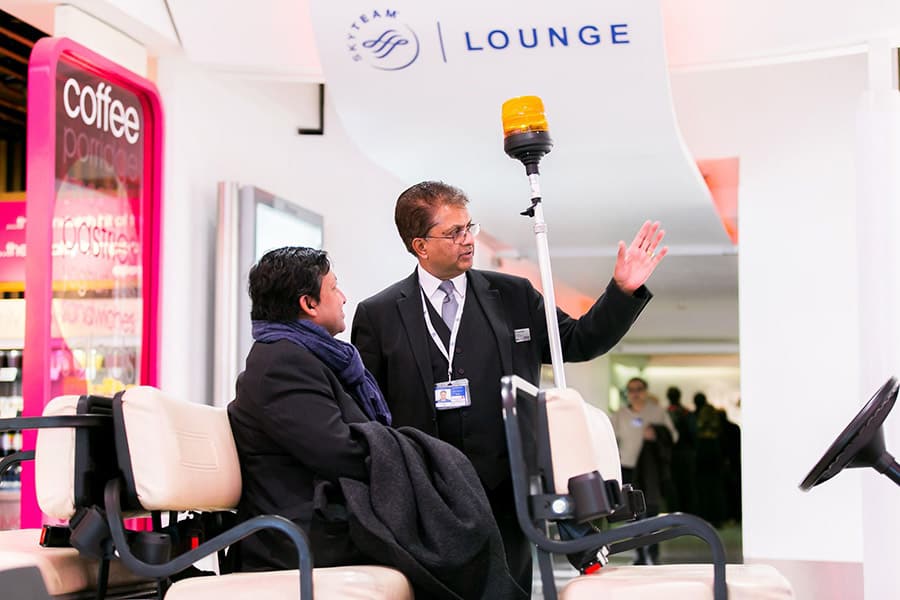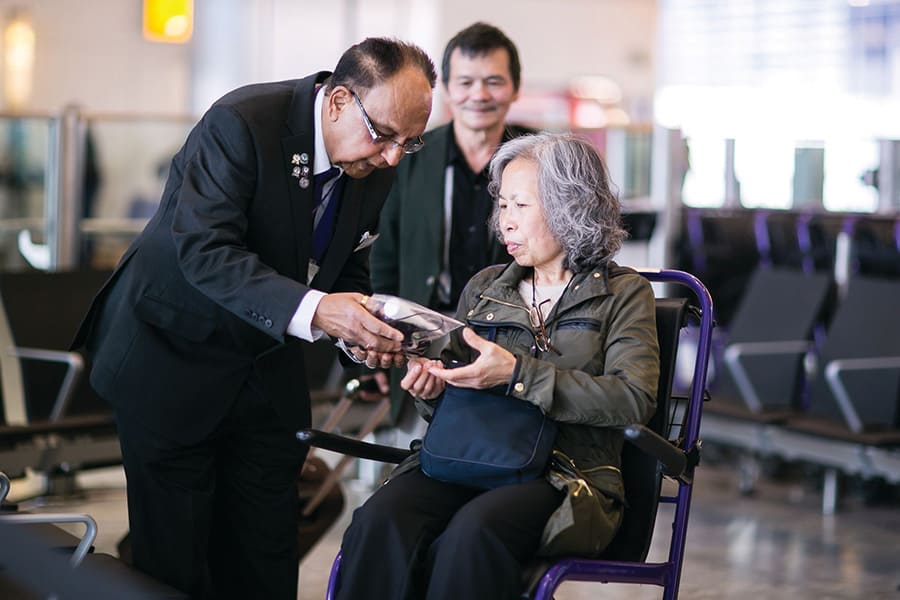ABM Aviation works with easyTravelseat inventor to support disabled passengers post-coronavirus pandemic
PRM (persons with reduced mobility) service provider ABM Aviation has partnered with disabled entrepreneur Josh Wintersgill, inventor of the easyTravelseat, to explore a range of opportunities in aviation and transport that reflect the flying habits and opinions of disabled passengers post-COVID-19.
This partnership comes on the back of a recent ‘COVID-19: Flying with a disability’ survey, where Josh asked 330 disabled people globally how they feel about travelling in a post-coronavirus world and what the aviation industry needs to think about moving forward.
As a direct result of this survey, ABM Aviation will be introducing a dedicated email address (emailusforconfidence@abm.com) for the disabled community to contact if they have any reservations about flying out of Manchester, Heathrow, Stansted, Liverpool or Edinburgh, where it currently provides passenger support services.
Samantha Saunders, Head of Innovation and Regulatory Compliance at ABM Aviation, commented: “As a PRM service provider for many airports across the UK, working closely with Josh will help ABM Aviation ensure that disabled people are being listened to and that necessary steps are being put in place both in the short and long term to provide greater accessibility for all.”
The ‘flying with a disability’ survey was based around three key objectives:
- To understand the views of passengers with a disability in a COVID-19 world.
- To provide greater insight for airports and airlines about their PRM (persons with reduced mobility) passenger expectations.
- To provide a voice for the disabled community within the aviation sector.
The survey revealed that one in three disabled people will not travel by air until a COVID-19 vaccine is available, while nearly 40 percent of individuals stated they may still travel before then.
Two in three disabled passengers would continue flying, but with a big ‘if’, ensuring that strict procedures and processes are in place to address significant concerns and dependencies.
According to the survey, the most common causes of concern for disabled people considering flying are:
- Lack of clean circulated air inside the cabin.
- Social distancing not being followed at the airports and on-board planes.
- Being in confined spaces and close proximity to others.
- Special assistance having to assist passengers through the airport, including on and off the plane.
- Inadequate seat provisioning and re-design making seats difficult to access due to the virus.
- Catching the virus abroad.
Failing to address such concerns could see PRM numbers drop consistently for the foreseeable future by up to 50-75 percent, says the survey.
Additionally, the survey highlighted that more than two-thirds of respondents said the financial constraints of COVID-19 have not made any impact on their decision to book future air travel.
This should be a reassuring message to the travel industry that the ‘Purple Pound’ remains relatively strong and – coupled with the industry providing reassurance and instilling confidence for passengers – the future outlook for PRM travel could remain optimistic, the survey outlines.
Josh highlighted that aviation and the travel industry on the whole needs to continue its focus on three things: harmonisation, information and communication.
He said: “From my personal perspective, this survey not only gives a voice for the disabled community, but it also helps the aviation industry better understand their needs and align support accordingly. It has confirmed my thought that for many disabled people, they want to get back to air travel as quickly as possible.
“As we move forward into a world of the ‘new normal’, I think we will start to see airports and airlines change the way we check-in, go through security, queue, board and sit in an aircraft. And this has to include provisions for disabled people and their thoughts in the process.
Prior to the COVID-19 pandemic, 54 percent of respondents flew more than once or twice a year. Now, 52 percent said they would wait, at minimum, six to 12 months before returning to the skies, 28 percent were unsure and an eager 20 percent said they would return within a month or as soon as it was deemed appropriate to do so.
When asking where these respondents would be willing to travel when they decide to fly again, 87 percent said they would be happy to travel domestically and internationally, while 13 percent would stick only to domestic travel.
“Technology is fundamental to the success of ensuring customer service excellence and critical for passengers requiring support going into this new world,” added Josh. “If done correctly, it will help these passengers with greater autonomy, trust, confidence, dignity and most crucially safety. I am delighted ABM Aviation has listened to our survey and is reacting to it, with its initial ‘email us for confidence’ initiative.”
ABM is a provider of facility solutions with capabilities including janitorial, electrical & lighting, energy solutions, facilities engineering, HVAC & mechanical, landscape & turf, mission critical solutions and parking, provided through stand-alone or integrated solutions.




